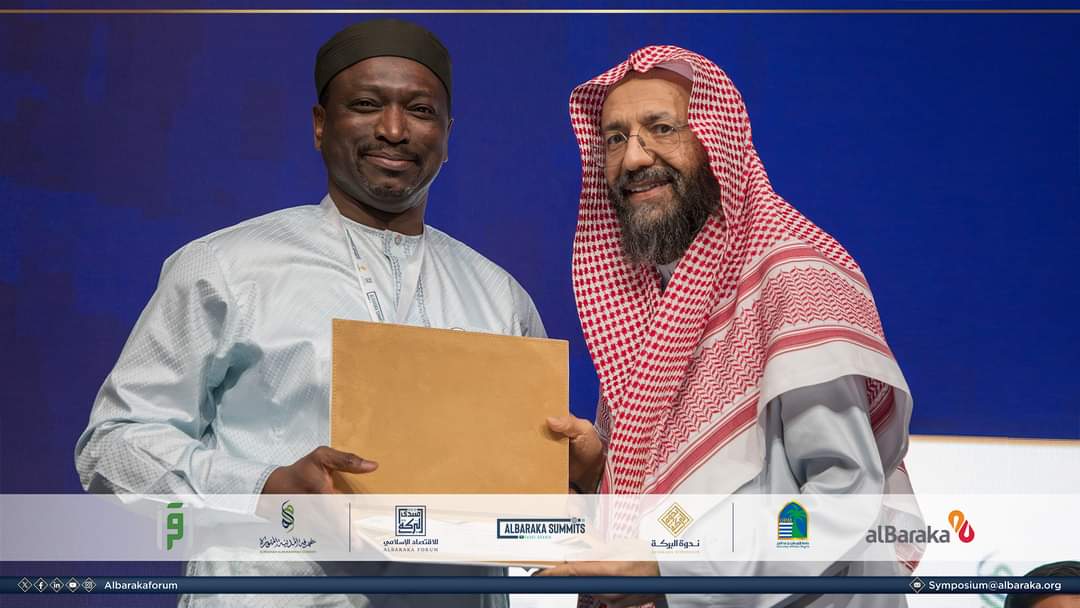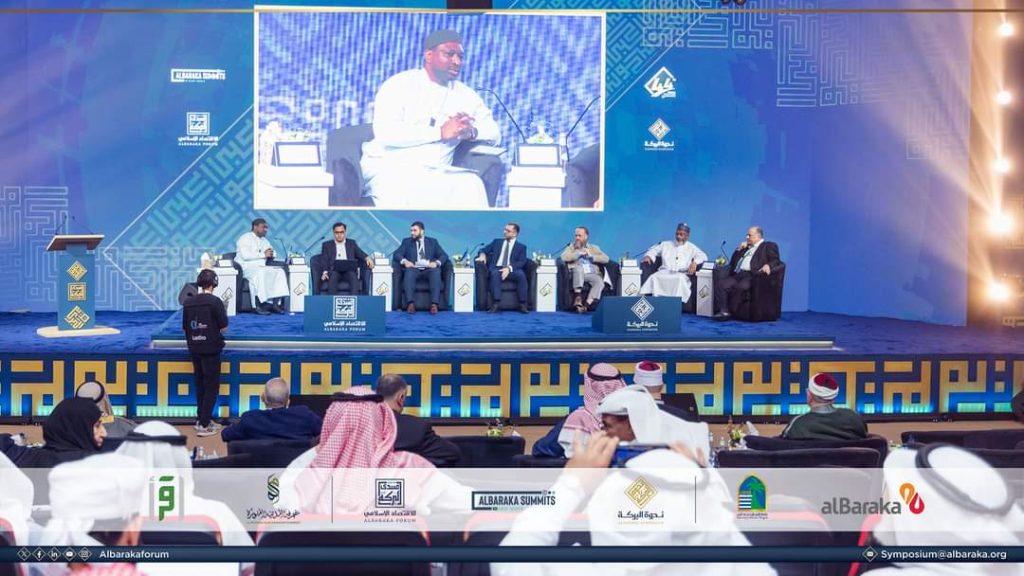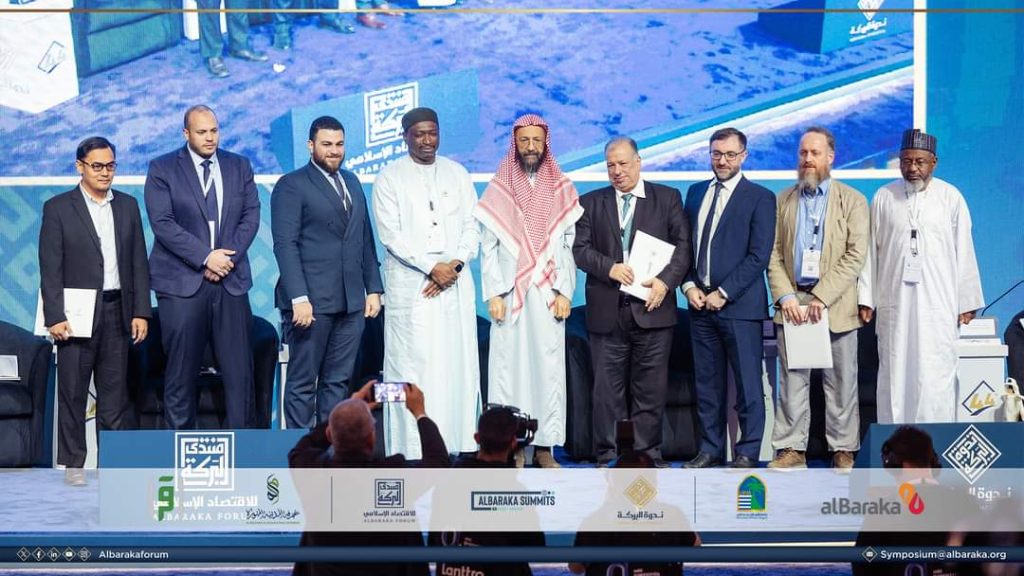
H.E. Prof. Koutoub Moustapha Sano, Secretary General of the International Islamic Fiqh Academy, chaired the 2nd session of the 44th Al-Baraka Forum on “Maqasid Al-Shari’ah: The Governing Framework of Islamic Economics” on Wednesday 18 Sha’aban 1445, corresponding to 28 February 2024 held in Medina, Saudi Arabia. The session was titled “Investment Tools in the Framework of the Maqasid Al-Shari’ah.”
His Excellency expressed his sincere thanks and appreciation to Al Baraka Islamic Economics Forum for their invitation. He congratulated its scientific committee on its meticulous choice of the title of this year’s forum, considering that Islamic economy needs a general framework that controls its flow and determines its interest. Nothing is more deserving of this than the Maqasid, and therefore, the symposium title is accurate and successful.
His Excellency explained that there is a need to move from the general narrative on Maqasid al-Shari’ah (purposes or objectives of Sharia) and its importance for the Islamic economy to talk about applying Maqasid in Islamic economy, stressing that the intended Maqasid are those pertaining to financial transactions. This is why he referred to Ibn Ashur’s focused and comprehensive discourse of Maqasid in general and the Maqasid of financial transactions in particular and pointed out that any discourse on Maqasid Shari’ah in the field of Islamic economics before reading what Ibn Ashur wrote is considered incomplete because Ibn Ashur is regarded as the only contemporary jurist who has developed a precise and deep understanding of this subject, which makes the need to benefit from his thought and views in this field urgent.
His Excellency then spoke about the Islamic economic reality, which includes a Sharia classification of contemporary financial methods and transactions, stressing that the harmony of contemporary investment tools related to the results of human innovations whose owners aim to grow and increase wealth by investing it is justified by the Maqasid dimension as a fundamental pillar from which the jurisprudential adaptation starts to achieve Sharia classifications that achieves the objectives, goals, and meanings based on a prudent Ijtihad. His Excellency also pointed out that resorting to Maqasid al-Shari’ah when talking about Islamic investment and its modern and renewable tools and methods highlights its importance in other issues of modern financial transactions and studying these tools and methods from specialists and experts by examining their Maqasid aspects, giving them more attention and grounding the legal opinion in it, is capable of eliminating many issues and answering many questions about the differences related to these modern investment methods.
His Excellency spoke about the need for more Ijtihad on investment instruments and their contemporary methods through Maqasid Shari’ah, establishing its rulings, and rationalizing its variables. His Excellency declared: “Ijtihad on the matters of investment tools and modern investment methods through Maqasid has become a religious obligation today, and establishing its provisions has become a modern necessity, as well as guiding its issues, resolving its novelties, and rationalizing its variables, all of which have become a contemporary benefit, all which aim to preserve the supreme Maqasid in wealth and business, which represent the purposes of justice, prosperity, growth, clarity, and stability” His Excellency also pointed out the importance of the role of Maqasid al-Shari’ah in understanding Shari’ah texts, interpreting them correctly when applying them to reality, and helping to determine the meanings of words and their outcomes, as well as the exact meaning intended by them, because they may have multiple meanings and different connotations.
His Excellency spoke about the tasks of investment purposes from the Islamic perspective and the means of achieving them. His Excellency explained that “the tasks of the purposes of investment from the Islamic perspective are centered around three main purposes, namely: Maintaining the sustainability of the development and increase of wealth, then maintaining the permanence of the circulation of wealth, and finally: Achieving the overall well-being of the individual and society. These main objectives depend on their realization to enable individuals and groups to fulfill the great divine mission for which they were created, which is the task of succession to God on earth by managing its affairs in the present and future.”
His Excellency added: “Through these objectives and their connection to the topic of investment, I believe that the sustainability of the promotion of wealth is a religious and realistic necessity, as humanity’s need for it increases daily due to the rapid developments in daily life. This statement is confirmed by the Qur’anic and hadithic texts urging earning and striving on the earth, prohibiting hoarding wealth, obligating zakat, prohibiting usury, and others, all of which establish and maintain this purpose. The monopolization and control of wealth by a few to control the destinies of the majority is forbidden through the realization of the second purpose, namely, the realization of the comprehensive well-being of the members of the Islamic society through economic prosperity, social stability, and security, thereby eliminating all manifestations of envy, hatred and heart disease among all its members.”
At the end of his speech, His Excellency pointed out that Sharia, through its noble objectives and meanings, aims to achieve the three purposes of financial investment methods and tools, stressing the importance of the purposes of the Sharia in investment in order to achieve the demands of humans and societies for comprehensive well-being.
His Excellency expressed his hope that this forum will issue comprehensive recommendations that include clear guidelines and solid foundations that will help to activate contemporary economic life and the role of Maqasid Al-Shari’ah in it in accordance with Sharia teachings, reach humanitarian and developmental goals, achieve vicegerency on earth, and serve mankind’s utmost benefits.
Read Also
Lastest










